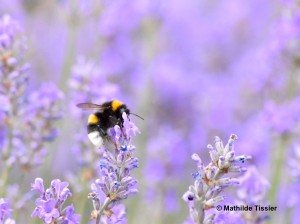LIFE Alister as a springboard
12 juillet 2018Two years ago, Mathilde Tissier’s research on European hamsters suffering from dementia due to a vitamin B3 deficiency led to a reaction from farmers along with researchers and the media. This totally innovative approach, ‘fortuitous’ even in the words of the scientist herself, paved the way for new avenues of research aimed at better understanding the gradual disappearance of biodiversity in farmland.
After obtaining a PhD in April 2017, Mathilde Tissier completed her mission by joining the LIFE Alister project at the Institut pluridisciplinaire Hubert-Curien CNRS (Herbert Curien Pluridisciplinary Institute, part of the National Centre for Scientific Research) in Strasbourg, and is currently involved in other areas of research on the same subject: the effects of diet on the physiology, behaviour, and even development of animal species.
From the European hamster to the chipmunk
The chipmunk is a small squirrel found in North America that has the particularity of breeding twice a year in years where there are peaks in food abundance. This behavioural characteristic intrigues researchers, as the chipmunk is capable of anticipating such increases in food, which do not occur every year, two to three months in advance. From July, Mathilde Tissier will be joining Bishop’s University in Quebec for three years as a post-doctoral fellow. There she will be a member of the Canadian team working on this subject.
The team currently comprises Dr Patrick Bergeron (Bishop’s University), Dr Denis Réale (UQAM) and Dr Dany Garant (Université de Sherbrooke). The purpose of her research will be to understand why the season in which pups are born affects their development and behaviour. Is the difference in diet between those born in the spring and those born in the autumn the cause? As in the case of LIFE Alister, this research will be carried out in a context of global change*.
The hare and pollinating insects
In parallel with this study on the chipmunk, with an Austrian team, Mathilde Tissier is also involved in research projects on the hare, along with projects on pollinating insects with researchers from Toulouse and the United States. In both cases research is also aimed at determining the impact of diet on the disappearance of these animals. In ecology, diet is in general mainly considered in terms of energy and protein intake, but the study on the European hamster has shown the important role of vitamins and essential amino acids. Mathilde Tissier’s work not only looks at physiology and animal behaviour, but also covers plant biochemistry in terms of food source.
Although not widely known, in the summer bees can consume up to 70% of corn pollen, this cereal being least rich in vitamin B3. Corn, however, is not the only cereal that is low in this vitamin; unlike wild plants, most cereals generally contain little vitamin B3. The question that then arises is: have plants that enabled animals to compensate for vitamin deficiencies disappeared from our farmland? The plants in question being crops that are closest to wild plants, and which we no longer grow.
This information, as in the case of the LIFE Alister project, might make it possible to determine which crop combinations could preserve the biodiversity of our planet.
To find out more: visit Mathilde Tissier’s website
*Global change, in the broad sense, includes changes to ecosystems caused by anthropisation currently occurring as part of the Anthropocene; a geological age in which human societies have had an impact, sometimes irreversible, on their environment. The term notably includes urbanisation, over-fishing, agricultural and climate changes, and the pressure they put on ecosystems.
Société des Amis des Universités de l’Académie de Strasbourg thesis prize
On Friday 22 June, Mathilde Tissier received this prize, sponsored by the Association Frédéric De Dietrich, in a ceremony presided by Michel Deneken (President of the University of Strasbourg), Catherine Florentz (Vice-President of the University of Strasbourg) and Claude Rousset (President of the Association des amis des Universités, or Friends of the Universities Association). Thesis prizes, awarded to 19 out of 464 doctoral students who defended their thesis in the previous year, are intended to highlight and promote the authors of the most outstanding theses defended at the University of Strasbourg in 2017.
In the photo: thesis directors and IPHC researchers Caroline Habold and Yves Handrich, along with Charlotte Kourkgy, Head of the European Hamster Project at the ONCFS (National Hunting and Wildlife Bureau).



![20180622_133539[4]](http://www.grand-hamster-alsace.eu/wp-content/uploads/sites/9/2018/06/20180622_1335394.jpg)


